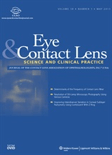
Eye & Contact Lens-Science and Clinical Practice
Scope & Guideline
Pioneering advancements in vision and lens research.
Introduction
Aims and Scopes
- Contact Lens Efficacy and Safety:
Research on the effectiveness and safety of various types of contact lenses, including soft, rigid gas permeable, and scleral lenses, for vision correction and management of ocular conditions. - Myopia Management:
Studies focusing on strategies to control myopia progression, particularly in children, including the use of orthokeratology, multifocal lenses, and pharmacological interventions. - Ocular Surface Disease and Dry Eye:
Investigations into the causes, prevalence, and treatment of dry eye disease, as well as the role of contact lenses in managing ocular surface conditions. - Corneal Health and Surgery:
Research on corneal diseases, surgical techniques, and post-operative care, including cross-linking therapies and keratoplasty. - Innovative Imaging and Diagnostic Techniques:
Development and evaluation of new imaging modalities and diagnostic tools for assessing ocular health, particularly in relation to corneal and anterior segment conditions. - Patient-Centric Outcomes and Quality of Life:
Focus on understanding patient experiences, satisfaction, and quality of life related to eye care and contact lens wear.
Trending and Emerging
- Artificial Intelligence and Technology in Eye Care:
Emerging research on the integration of artificial intelligence in contact lens fitting and management, enhancing personalized care and improving patient outcomes. - Scleral Lens Innovations:
A growing focus on scleral lenses, including their use in complex cases such as keratoconus and post-surgical rehabilitation, showcasing advancements in fitting techniques and materials. - Multifocal and Orthokeratology Lens Research:
Increased interest in multifocal and orthokeratology lenses for myopia control, particularly in pediatric populations, highlighting the need for effective strategies to combat the myopia epidemic. - Ocular Surface Microbiome Studies:
New research exploring the role of the ocular microbiome in eye health and disease, including its implications for dry eye and contact lens-related complications. - Telemedicine in Eye Care:
Emerging studies on the use of telemedicine for eye care consultations, particularly post-pandemic, addressing accessibility and patient management.
Declining or Waning
- Traditional Contact Lens Materials:
Research on older contact lens materials and solutions has decreased as newer materials and technologies gain prominence, reflecting a shift towards more advanced and comfortable options. - General Epidemiology Studies:
While epidemiological studies remain important, there has been a notable decline in studies focusing broadly on the prevalence of ocular diseases, as more specific and targeted research emerges. - Basic Mechanisms of Dry Eye Disease:
Research concentrating solely on the basic mechanisms of dry eye disease has waned, with a shift towards clinical applications and treatment strategies. - Non-Clinical Research on Contact Lens Use:
The volume of non-clinical research, such as theoretical studies or basic science not directly linked to clinical application, appears to be decreasing in favor of clinical efficacy and patient outcomes.
Similar Journals
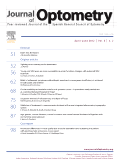
Journal of Optometry
Enhancing clinical practices with groundbreaking findings.The Journal of Optometry, published by Elsevier, is a leading open access journal dedicated to advancing the field of optometry and vision science. With an ISSN of 1888-4296 and an E-ISSN of 1989-1342, this journal serves as a pivotal platform for researchers, practitioners, and academics alike to disseminate and engage with high-quality original research and review articles. As of 2023, the journal holds an impressive Q2 ranking in the Optometry category, demonstrating its influence and relevance, particularly as it ranks #2 out of 12 in the Health Professions - Optometry category on Scopus with an 87th percentile. Since becoming open access in 2008, the Journal of Optometry has prioritized accessibility and the exchange of ideas, enriching the scholarly community and enhancing practical application in clinical settings. The journal welcomes submissions that push the boundaries of ocular research, clinical practices, and the education of optometry professionals, making it an essential resource for anyone invested in the future of eye health.
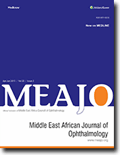
Middle East African Journal of Ophthalmology
Fostering collaboration for a brighter vision.The Middle East African Journal of Ophthalmology is a distinguished publication dedicated to advancing knowledge in the field of ophthalmology, published by Wolters Kluwer Medknow Publications in India. With a robust focus on contributions that bridge the gap between clinical practices and scientific research, this journal serves as a crucial platform for researchers, practitioners, and students alike. Since its inception, it has consistently disseminated high-impact research, achieving notable recognition with a Q3 ranking in both Medicine (miscellaneous) and Ophthalmology categories as of 2023. Despite being a newer entrant into the scholarly landscape, it features an array of innovative articles, highlighting significant advancements and emerging trends in ocular health. Researchers may access a wealth of knowledge through its open access articles, promoting the dissemination of vital ophthalmic research that is relevant in both Middle Eastern and African contexts. By fostering collaboration and communication among professionals in the field, the Middle East African Journal of Ophthalmology is committed to championing excellence in eye care and elevating the standard of research applicable to global populations.

EUROPEAN JOURNAL OF OPHTHALMOLOGY
Elevating Knowledge in Ophthalmology for Better OutcomesThe EUROPEAN JOURNAL OF OPHTHALMOLOGY, published by SAGE PUBLICATIONS LTD, is a leading international journal in the field of ophthalmology, dedicated to advancing the understanding and treatment of ocular diseases and disorders. With an ISSN of 1120-6721 and an E-ISSN of 1724-6016, the journal aims to provide a platform for innovative research, critical reviews, and comprehensive studies that span the diverse aspects of the discipline. As part of its commitment to disseminating high-quality research, the journal is indexed in Scopus, achieving an impressive rank of #47 out of 137 in the Medicine - Ophthalmology category, indicating its strong impact within the academic community. With a current impact factor that places it in the Q2 quartile for both Medicine (miscellaneous) and Ophthalmology as of 2023, it offers researchers and practitioners access to important findings and developments in eye health. The journal's converged years from 1991 to 2024 exemplify its longstanding commitment to the field, making it an essential resource for anyone looking to stay at the forefront of ophthalmological research.
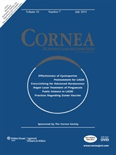
CORNEA
Driving advancements in corneal research since 1982.CORNEA is a prestigious peer-reviewed journal published by Lippincott Williams & Wilkins, focusing on the rapidly advancing field of ophthalmology with a particular emphasis on corneal research and diseases. With an impact factor categorized in the prestigious Q1 quartile for its discipline, CORNEA has established itself as a leading platform for the dissemination of both fundamental and clinical studies since its inception in 1982. The journal is ranked 25th out of 137 in the Scopus Medicine-Ophthalmology category, placing it in the 82nd percentile among its peers, which underscores its vital role in influencing ocular research and clinical practices. While the journal is not currently open access, it provides valuable insights and updates for professionals, researchers, and students working to advance knowledge in corneal health, contributing significantly to the ongoing dialogue in the ophthalmological community. With a commitment to excellence, CORNEA continues to publish high-quality research and reviews in its pursuit to improve ocular outcomes and patient care.
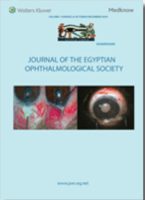
Journal of the Egyptian Ophthalmological Society
Unlocking the future of eye care through peer-reviewed studies.Journal of the Egyptian Ophthalmological Society is a premier academic journal dedicated to advancing the field of ophthalmology through high-quality peer-reviewed research. Published by Wolters Kluwer Medknow Publications, this journal plays a critical role in disseminating vital findings and innovations in eye care, fostering knowledge exchange among researchers, practitioners, and educators worldwide. Since its transformation to Open Access in 2014, it has significantly enhanced the accessibility of eye health information, thereby broadening its impact on the global scientific community. With an ISSN of 2090-0686 and an E-ISSN of 2314-6648, the journal aims to tackle contemporary issues in ophthalmology, including clinical practices, public health, and technological advancements in eye care. The journal's commitment to excellence ensures that it remains a vital resource for those looking to contribute meaningfully to this dynamic and crucial field.

Nepalese Journal of Ophthalmology
Advancing Eye Health Through Innovative ResearchNepalese Journal of Ophthalmology, established by the NEPAL OPHTHALMIC SOC, is a premier Open Access journal dedicated to advancing the field of ophthalmology. With its ISSN 2072-6805 and E-ISSN 2091-0320, the journal provides an important platform for sharing innovative research and clinical findings in eye health. Since its inception in 2009, the journal has aimed to disseminate high-quality research that addresses contemporary challenges in ophthalmic practices, thus supporting improved patient care and outcomes within Nepal and beyond. The journal has achieved notable recognition, evidenced by its Scopus rank of #267 out of 915 in the field of General Medicine, placing it within the 70th percentile. Researchers, professionals, and students will find valuable information in its comprehensive articles, which cater to a multidisciplinary audience interested in the latest developments in ophthalmology. Emphasizing accessibility, the journal ensures that all published content is freely available, fostering collaboration and knowledge sharing in the global medical community.
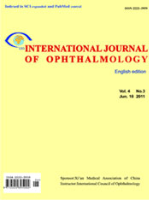
International Journal of Ophthalmology
Transforming Eye Health Through Open Access InsightsThe International Journal of Ophthalmology, with ISSN 2222-3959 and E-ISSN 2227-4898, is a premier open-access publication dedicated to advancing the field of ophthalmology. Published by IJO PRESS in China, this journal has been a valuable resource since its inception in 2005, providing a platform for groundbreaking research and clinical studies in ophthalmic science. With an impressive Q2 ranking in the 2023 Ophthalmology category and a Scopus rank of #65 out of 137, the journal consistently showcases high-quality articles that contribute significantly to the understanding and treatment of eye diseases. Since adopting an open-access model in 2010, it has expanded its reach, allowing researchers, professionals, and students worldwide to access vital knowledge in the field. The journal aims to bridge the gap between laboratory research and clinical practice, making it an essential resource for those committed to improving visual health and advancing ophthalmologic education and innovation.

Asia-Pacific Journal of Ophthalmology
Bridging research and practice in eye care.Asia-Pacific Journal of Ophthalmology is a distinguished open access journal published by the Asia-Pacific Academy of Ophthalmology (APAO), specializing in the latest advancements and research in ophthalmology. Since its inception in 2013, this journal has established itself as a vital platform for disseminating innovative findings and clinical practices across the Asia-Pacific region and beyond. With an impressive Scopus ranking of #10 out of 137 in the field of Medicine (Ophthalmology), placing it in the 93rd percentile, it garners significant attention and respect within the academic community. Currently holding a Q1 categorization in both Medicine (miscellaneous) and Ophthalmology, the journal embraces a broad scope that encompasses clinical studies, experimental research, and reviews aimed at enhancing the understanding and management of eye health. Its open access model since 2019 ensures that all published works are freely accessible, promoting greater collaboration and knowledge sharing among researchers, clinicians, and students. Situated in the Netherlands with a prominent address in Hong Kong, the journal serves as an essential resource for anyone dedicated to the field of ophthalmology.
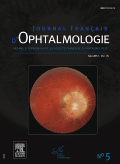
JOURNAL FRANCAIS D OPHTALMOLOGIE
Fostering collaboration in the global ophthalmological community.JOURNAL FRANCAIS D OPHTALMOLOGIE, published by MASSON EDITEUR, is a prominent peer-reviewed journal that serves as a vital resource in the field of ophthalmology. Launched in 1978, this esteemed publication continues to make significant contributions to the advancement of ocular health and vision science, with its scope encompassing clinical practices, innovative research, and the latest technological advancements in ophthalmic care. Based in France, the journal is recognized in the 2023 category quartiles with a Q3 ranking in ophthalmology, reflecting its dedication to quality scholarship within a competitive landscape, as evidenced by its positioning in the 30th percentile of the Scopus rankings. While it operates without Open Access, the journal remains crucial for professionals, researchers, and students alike, providing a platform for sharing knowledge and fostering collaborations in the global ophthalmological community.
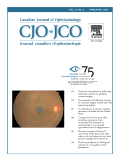
CANADIAN JOURNAL OF OPHTHALMOLOGY-JOURNAL CANADIEN D OPHTALMOLOGIE
Illuminating the future of vision care.Canadian Journal of Ophthalmology - Journal Canadien d'Ophtalmologie, published by the prestigious Canadian Ophthalmological Society, serves as a leading platform for disseminating cutting-edge research in the field of ophthalmology. With an ISSN of 0008-4182 and E-ISSN 1715-3360, the journal boasts a commendable impact factor and maintains a strong presence within the medicine and ophthalmology categories, ranking in the Q2 quartile. This journal not only provides significant insights into clinical practices and advancements but also contributes to the understanding of ocular health issues facing contemporary society. Since its inception in 1966, it has published high-quality research, making substantial strides in both practical and theoretical aspects of ophthalmology until 2024. Although it is not an open-access journal, it establishes a vital resource for researchers, professionals, and students alike, fostering an informed community dedicated to improving vision care.